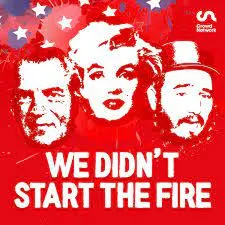In the mid-1980s, a young person commented to Billy Joel. In the young person's mind, the world of the 1980s was plagued with tumultuous events. In passing, he said, "I bet the world must have been a more peaceful place when you were growing up."
That got Billy Joel thinking. He started jotting down all the significant events from his birth in 1946 throughout his time growing up in New York till the summer of 1989.
Like that, he came up with close to 119 incidences that impacted him at least. He started arranging the list, like a good composer would, and wrote a record-smashing hit that everyone in the 90s would know.
Billy Joel realized as he reminisced about the years that went by that the world had always been a restless place. Looking back on the events, one thing is clear: It was as unsettled then as it is now.
Completing all the podcasts makes me feel like I'm in slumber while everybody else is doing the stuff. Many things were below the radar, and time is the best teacher for what happened in the past and will happen in the future. Many more things happened in the background without the rest of the world's knowledge. Some events still remain enigmas, which the world will never know, like whether Oswald's bullet really did kill JFK on the fateful day in Dallas.
Starting with Harry Truman and his questionable decision to drop the nuclear bomb in Japan, the podcasters dissect Doris Day. And we soon discover that her life was not like the 100-watt sunshine smile she flashes in her movies. Her life ambition was crushed when she was involved in a motor vehicle accident early on life. She had to switch careers. Married with a child by 22, life was not easy. Married four times, in the later stage of her life, she had fought court case after court case to retrieve her life savings from her lawyer, who had swindled her.
Like that, we learn about what has been happening in the background beyond the glitz of neon and what is printed in the media. It ends with the late 1980s staged Cola War between Pepsi and Coke—a fake war started to create publicity while the fizzy drink makers laugh all the way to the bank. Perhaps if the song had been written a bit later, he would have written about the fall of the Berlin Wall and the collapse of communism.
We didn't start the fire, It was always burningSince the world's been turningWe didn't start the fire, No, we didn't light itBut we tried to fight it
The Imperialists, specifically the Americans, in the post-war era, can deny all they want that they did not start the chaos that is rampant around the world. The sad truth is that the turmoil we are in has its roots deeply planted by the actions of people before us, intentionally or otherwise. For one, the current Middle East Crisis originates from the Imperialists' interference in the regional exploration and usurping of black gold and strategic power control of local politics. They fanned fires to appear as peacemakers akin to pinching the baby's bottom and singing lullabies simultaneously. While they were at it, they decided to sell arms to both warring sections. Why not? And sing 'We didn't start the fire, it was always burning...'
(P.S. Highly recommended for history geeks.)
</






.png)





.jpeg)

















